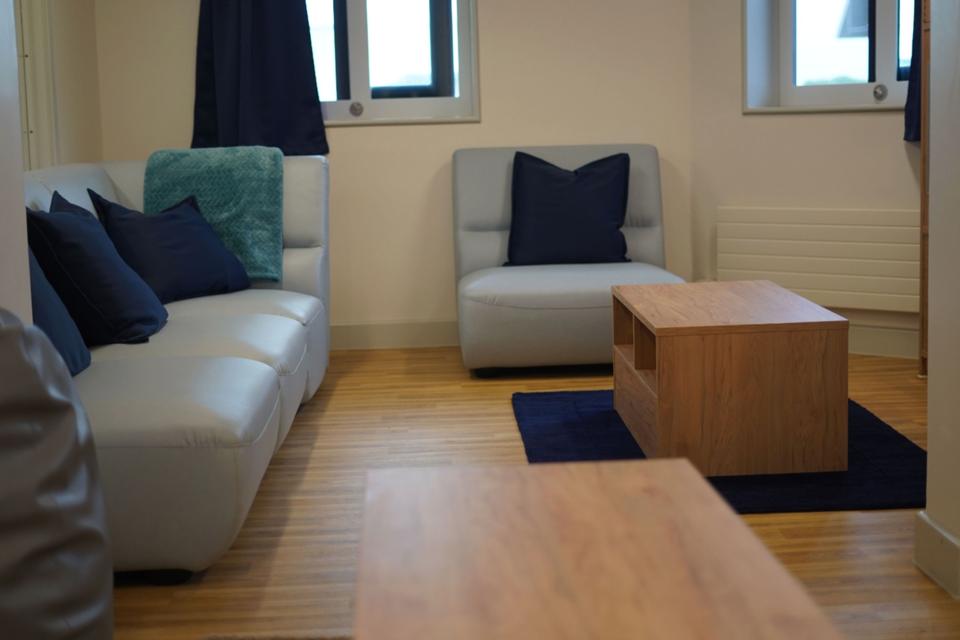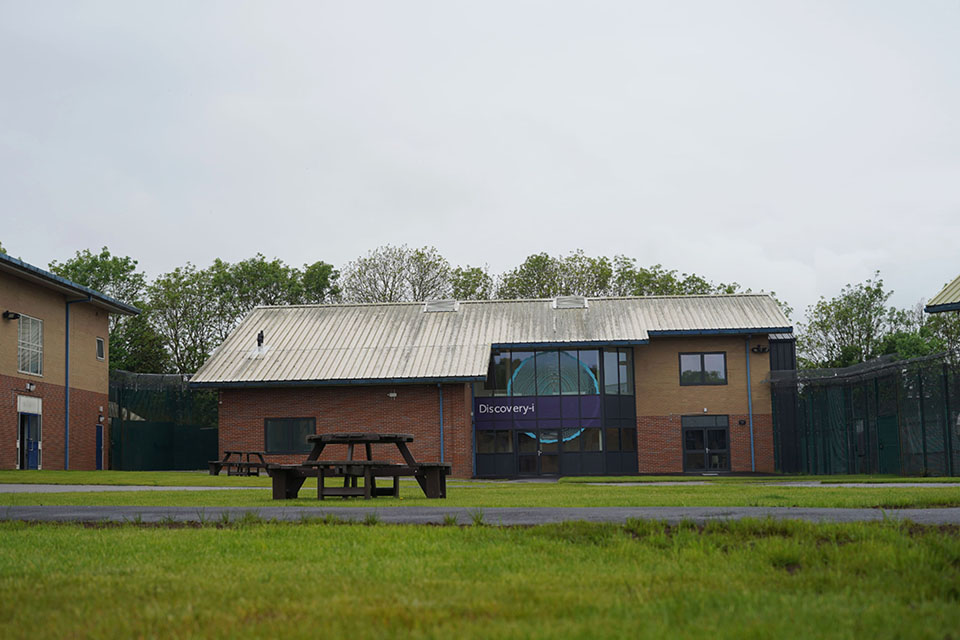Back in May, I joined Minister Argar and the Youth Custody Service to visit the UK's first secure school and explore its revolutionary approach to youth justice. As we toured the site, what stood out to me was an unmistakeable feeling of care.
The Oasis Restore secure school has now opened its doors and has started to welcome its first children.
What does the secure school offer?
The school, which was a former secure training centre, felt worlds away from my experiences as a prison officer at Feltham young offender's institution (YOI) in 1997 and other adult prisons throughout my career, with more similarities to university accommodation than custody. The environment felt compassionate and child-orientated, nurturing children to change, grow and learn.
Security was built into the infrastructure without feeling oppressive, but still appropriately secure - there were no bars on the windows, no keys or locks, only wristband-operated fobs. It was these subtle differences that made me leave Oasis Restore feeling hopeful.
The bedrooms were calming and quiet with private ensuite bathrooms and built-in computer screens for doing homework and watching TV. The attention to detail throughout was evident. There was artwork on the walls, and soft blankets and sofas in the shared living spaces. These are incredibly important to help children learn to cohabit and foster a sense of community and responsibility.
Oasis Restore provides family rooms with kitchens so that children can cook and eat with their families when they visit. Our guide Dr Sadie pointed out that this can be very culturally important when living away from home, not least for successful rehabilitation but also for rebuilding existing family relationships. Siblings often visit with families, and evidence shows that intergenerational and sibling offending is common, so having a space promoting learning, togetherness and care is key to prevent further offending among families.

A shared living area in one of the flats at the secure school.
The site boasts brand-new state-of-the-art facilities, including 3D printers in the design technology classroom, a hair and beauty salon and even music recording booths. While other sites do provide similar facilities, never had I seen them at this standard before. These facilities provide a wide range of educational opportunities, including core academic subjects and vocational training in areas like barbering, drama and catering, that children might otherwise have never been exposed to.
Therapeutic sensory rooms are also woven throughout the site. These supportive spaces have soft beanbags and padded walls to support children to regulate their emotions during the day and take time out when needed.
Looking to the future
As the tour was finishing, I stopped to speak to a restorative practitioner who was showing some of the creative activities on offer for children. She explained that she would be supporting children through every part of their day at Oasis Restore, be that walking with them to the education centre in the morning, or just being there to chat.
When I asked her what part of the new school she was most looking forward to, she said, "I'm just excited for the children to come now." It's clear that what makes this approach to youth custody different isn't just the holistic model or the modern facilities; it's the people.
Strong relationships between staff and children are at the heart of the Oasis model, to truly understand a child's journey. Oasis Restore's team are highly trained and committed to providing responsive, psychologically informed and developmentally appropriate models of support and education for children in their care. Relational practice is also crucial, with staff committed to loving children like their own, and this shone through from the practitioners I spoke with at the school.
The Oasis secure school is a prime example of how custody for children can and should be done: care-focused, needs-led and with children at the heart. This model inspires hope for the future about how we can best support children to go on to live crime-free lives and make our communities safer places with fewer victims.
What is a 'secure school'?
The first-of-its-kind secure school in Rochester houses children who are on remand or sentenced to custody. But what exactly is a secure school?
Oasis Restore places education and healthcare at the heart of its approach to support children and steer them away from reoffending. This unique model was recommended by Charlie Taylor, the HM Chief Inspector of Prisons, who has long advocated for a different approach to children in custody. In 2016, prior to becoming Chair of the Youth Justice Board from 2017-2020, he conducted an independent review of the youth justice system
The Oasis Restore philosophy
At the Youth Justice Board, we have long advocated for a rethink of how children are cared for in custody. This is because our evidence tells us that to be effective, secure settings must be small and replicate a safe family home environment with a sense of community and trust. They should also have excellent healthcare and education provisions.
The Oasis Restore model mirrors this, and I was pleased to see that these values shine through when visiting the school. Oasis Restore is guided by the understanding that children are different from adults. Its philosophy ensures that each child's voice is heard and valued, and opportunities are created for them to contribute within a school community.
In the words of the school: "Oasis Restore is a secure school enabling young people to live their best lives, through education, wellbeing, and hope."
The secure school gives children the opportunity to make positive choices about their futures upon release from custody. By equipping them with essential skills and education, the school not only benefits children but hopes to reduce crime rates and make our communities safer places to live with fewer victims.
Who is the Oasis Restore secure school for?
Although the number of children in custody is the lowest on record since records began (an average of 440 children were in custody between 2022-23), we know that the children who remain in the secure estate are vulnerable and often have complex needs.
2021 Census data showed that more than three-quarters (79.8%) of people who went on to receive a custodial sentence had been identified with special educational needs (SEN) at some point during their schooling
Lower education levels are also likely. The same dataset also found that young adults who receive custodial sentences have lower levels of educational attainment, with only 37% achieving the expected level of English and maths by the end of key stage 2 compared with 53% of peers with non-custodial sentences.
In a 2022 joint inspection of education, training and employment services from HM Inspectorate of Probation, almost 65% of children had been excluded from school from at some point
Justice-involved children have also experienced higher levels of trauma throughout childhood and themselves are victims. This makes it crucial for the school to be care-focused, needs-led, and Child First. In one study of 80 children, over 75% had experienced family violence or child abuse
The secure school will care for children aged between 12-18-years-old who are on remand or sentenced to custody. It will be home to up to 49 children at any one time, both girls and boys. Every child will be enrolled in formal education or training and encouraged into further study or employment on release. This innovative new model of care will promote rehabilitation and contribute to positive outcomes for children, leading to fewer victims and safer communities.

The Discovery-i education centre at the secure school.
What makes Oasis Restore different?
The Oasis Restore secure school is unique in its approach and Steve Chalke, founder of Oasis Charitable Trust, said to visitors at the opening event: "From the day children arrive, the focus is on preparing them for the day they leave."
The school has been co-designed with children working with youth justice services and will be registered as both an academy and a secure children's home. It will be inspected by Ofsted and held to the same standards as other schools across England.
While the current secure estate is not fit for purpose, the secure school offers a Child First redesign. It's an innovative, holistic approach to custody for children within a secure setting. This is what distinguishes the secure school from existing youth custody provisions and sends a message to children that they are valued; something many may not have experienced growing up.
I spoke to a colleague from NHS England during the visit, a key partner in the development of the school, and heard about just some of the wellbeing services on offer, including advice on dieting, smoking, body image, as well as wider mental health and physical health support.
Education at the school is based on the reflective practice model, with a therapeutic approach to learning. It is recognised that many of the children who will live at the secure school are likely to be disengaged from education and so staff are specially trained to focus on one-to-one support and children's individual needs, which their curriculum will be tailored around.
A place of hope
The secure school is a place where children can feel safe and be supported by well-trained staff who are committed to developing positive purpose. We at the YJB support and advocate this approach in line with the evidence base. I echo the words of Ed Cornmell, Executive Director of the Youth Custody Service, when he says the school represents a "revolutionary change for the youth justice system."






